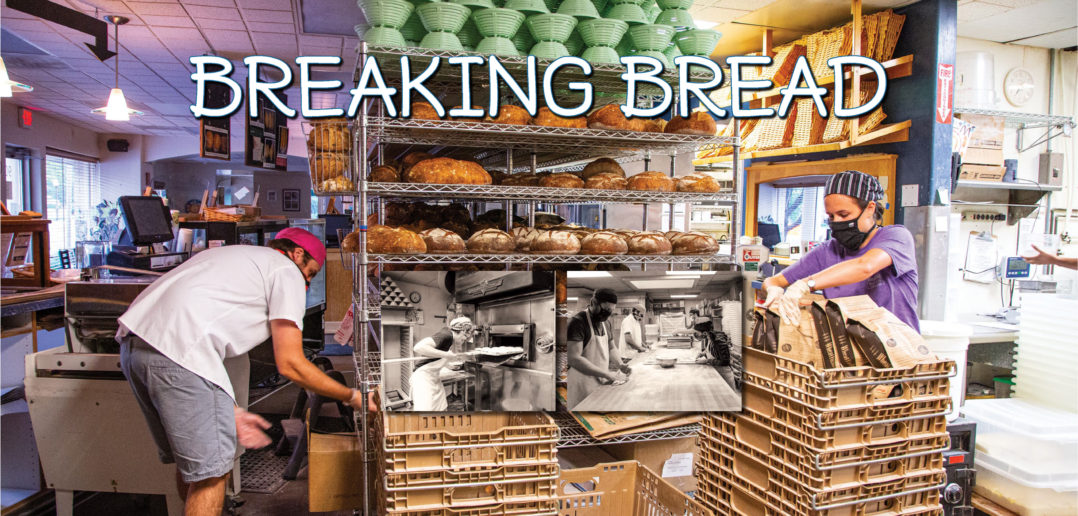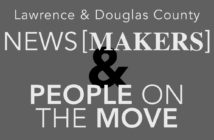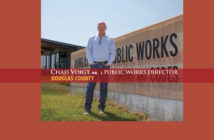| story by | |
| photos by | Steven Hertzog |
Lawrence bakeries have earned the title of “essential” by providing not only bread to grocery stores and customers, but also a feeling of comfort and support to local residents.
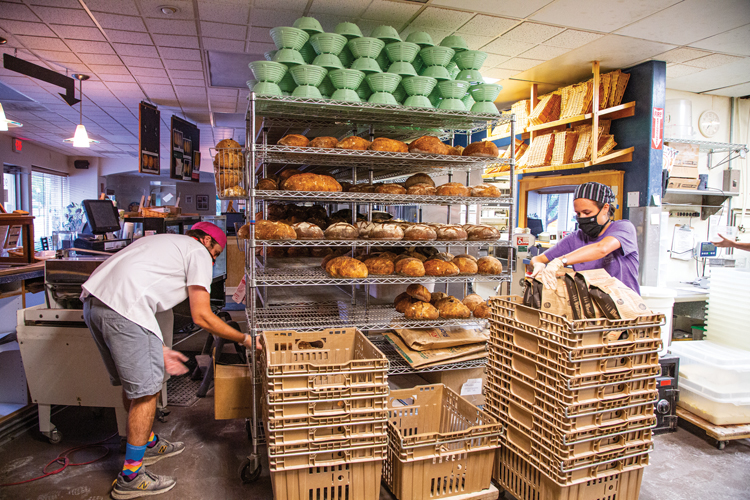
The Wheatfield staff hard at work in the early hours getting ready for their morning customers
As a staple food across the globe, bread, in all its various forms, provides quick, easy and inexpensive sustenance for people everywhere. It is not surprising, then, that businesses that make, bake and sell bread are considered “essential” during the current global pandemic. This label makes sense for large grocery stores responsible for meeting the needs of a huge range of customers, but what does it mean for the smaller Lawrence bakery? Three downtown bakeries, 1900 Barker Bakery and Café, Great Harvest Bread Company and WheatFields Bakery Café, have learned just what it means to be an “essential business” during this global pandemic.
COVID-19 quickly clarified for each of these bakeries just how essential they are. WheatFields has noticed an uptick in orders from grocery stores, who turn to them when they run out of bread and cannot get more from large, national distributers quickly. Max Watson, bakery manager, explains: “WheatFields offers these grocery stores a more direct process (fewer calls, steps and channels to go through) and a faster response time, which enables them to meet their customers’ needs by getting bread back on their shelves more quickly.” Without bakeries like WheatFields, many local grocery stores would have a difficult time meeting customer demands for bread and other bakery items.
These bakeries are not only essential to local grocery stores, they are essential to individuals. As the pandemic persists, and people are urged to keep their distance from one another, Sarah Burtch, owner at Great Harvest Bread Company, has noticed an increase in customers who come to her bakery not only for the convenience it offers them but because it allows them to get what they need without having to go into crowded grocery stores. For those who are immunocompromised or are just anxious about contracting or passing the virus, local bakeries offer these individuals a reliable place to purchase what they need without having to encounter too many others.
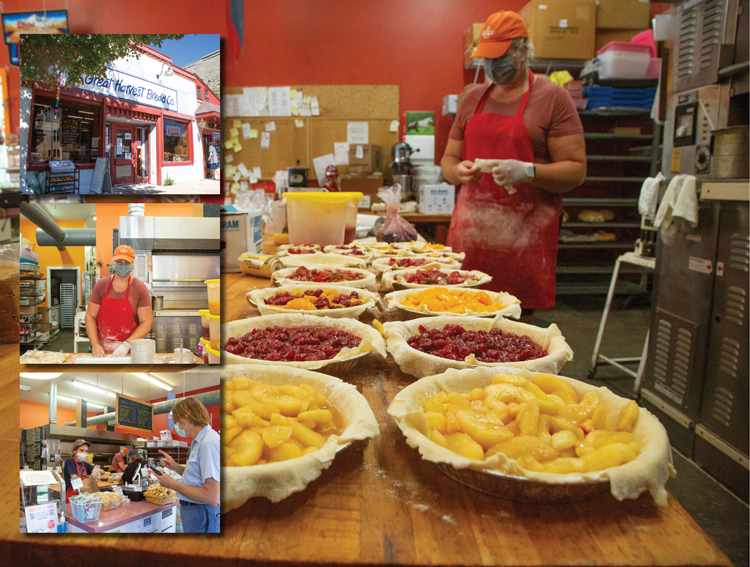
Above: Sarah Burtch, owner of Great Harvest Bread Company making her pies; Left: Great Harvest storefront, Sarah making bread, and the local mailman delivering mail and ordering goods
And because more people are without work, grocery bills have gone up for families with children who are no longer attending school in-person, and COVID-19 has made acquiring resources and help more difficult, bakeries such as Great Harvest are vital to the community because they provide resources to those most challenged by the pandemic. Great Harvest supports the community by donating to local food banks, various organizations and health-care workers, and by providing access to food and water for the homeless.
These bakeries are not essential merely because they provide a staple food product for community businesses and individuals. As it turns out, bread is only the beginning of what makes them so important to our community. In fact, what COVID-19 has really helped highlight is how these bakeries provide a sense of consistency and stability during a time that is so inconsistent and unstable. Taylor Petrehn, owner of 1900 Barker Bakery and Café, notes that although “there was definitely a moment when we had to decide if the product we serve was truly something people couldn’t live without,” the defining moment was in realizing that “we also were serving one of the only feelings of normalcy during a really scary time for a lot of people …Beyond the staple product that we’re creating, we’re also creating a positive atmosphere, safety, hope and a place for community to happen, even if it’s in a socially distant way.”
Burtch agrees. “There are times when coming [to Great Harvest]and getting a fresh loaf of bread or a cinnamon roll is just what our guests need to feel like everything is going to be OK.” It is evident that, like the bread they sell, these local bakeries do more than simply fill the stomach; they offer a sense of comfort in a time when the world feels overwhelming and unsteady.
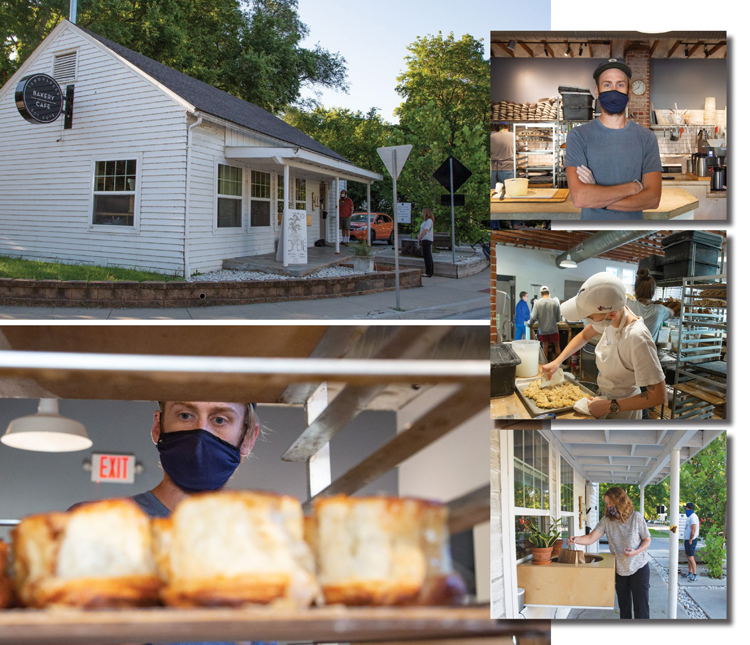
Above: 1900 Barker Bakery Café storefront and owner Taylor Petrehn gathering cinnamon rolls for a customer; Right: Owner Petrehn in the 1900 Barker Bakery with staff; LBM and Food Writer Anne Brockhoff is a fan of 1900 Barker Bakery
PLANNING AND FLEXIBILITY
Despite offering so much to the community seemingly with ease, each of these bakeries has had to deal with difficulties because of COVID-19. Each one has experienced an increase in workload. In some cases, social-distancing guidelines have meant having fewer employees working during each shift. That means there are fewer people responsible for completing more work.
Adapting to the increase in work is compounded by the need to adapt to the constant changes that both businesses and individuals face as the pandemic persists. For instance, COVID-19 has demanded these bakeries plan ahead to anticipate any potential problems in the supply chain. Though each bakery has experienced few supply-chain issues, the owners and managers understand how some larger distributors are feeling the strain of the pandemic and noted the necessity of planning ahead and being flexible when certain items are unavailable.
Each bakery has developed unique solutions that enable them to continue to serve the community even when they are unable to acquire the ingredients they need from their normal suppliers. For example, in the same way local grocery stores rely on WheatFields for bread, Petrehn notes that working primarily with smaller, local suppliers for most of their raw materials has given 1900 Barker a better chance of keeping up with customer demand. Similarly, Burtch relies on her community relationships when she is unable to acquire a vital ingredient. Buying supplies from local grocery or bulk stores, or borrowing an item from the Great Harvest in Kansas City enables her to consistently supply customers with the products they want and need. And in an effort to provide the most consistent menu and service possible, Watson notes that during the pandemic, WheatFields has occasionally pared back the many varieties of breads offered. In this way, it can provide a more consistent and reliable menu for long-term customers who have come to depend on them.
While change can be challenging, each of these bakeries has worked tirelessly to implement necessary changes as smoothly as possible. Anticipating change and quickly adapting to it when it occurs has enabled them to meet the needs of the community more effectively.
Yet each bakery’s ability to provide products, sustenance and a feeling of normalcy, as well as to overcome supply-chain challenges, hinges on the support and commitment of their employees. WheatFields’ Watson notes that bakeries like his employ individuals with specialized skills to do specialized work. These individuals are not easily replaced, so it is crucial to the success of the business to protect their safety and health, especially during a pandemic. Making sure employees’ health concerns are taken seriously is critical. Petrehn explains that 1900 Barker has extended to its employees the option to stay home if they ever feel unsafe.
Beyond physical health, considering employee emotional health is also important, especially as this pandemic has no end in sight. Watson emphasizes the importance of recognizing employees as “human beings with their own experiences and lives, which are being deeply affected by COVID-19 and our quickly changing world.”
It is no doubt this empathetic insight on the part of Burtch, Petrehn and Watson informs their business culture and motivates their employees to return to work each day. In fact, despite offering employees the option to stay home, Petrehn notes that at 1900 Barker, “most people opted to keep coming back day after day because of the value they place on their work here” and describes his staff of 12 as “passionate about the work we do.”
Watson describes the work culture at WheatFields as one that was consciously constructed to create trust, inclusivity, friendship, support and accountability, and says bakery employees are not only passionate about their work but also proud of it. Burtch describes her six-person staff as a family that has “a lot of love for each other, for our customers and for baking.”
Though COVID-19 has deeply impacted their businesses in a number of ways, 1900 Barker Bakery and Café, Great Harvest Bread Company and Wheatfields Bakery Café each have earned the label “essential.” Not only do they supply the community with the sustenance and stability difficult to find elsewhere, they do so in an environment committed to sustaining and supporting their employees.

